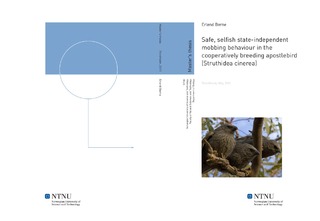Safe, selfish state-independent mobbing behaviour in the cooperatively breeding apostlebird (Struthidea cinerea)
Master thesis
Permanent lenke
http://hdl.handle.net/11250/244823Utgivelsesdato
2011Metadata
Vis full innførselSamlinger
- Institutt for biologi [2571]
Sammendrag
In the last few decades stochastic dynamic modeling (SDM) has been used to explore adaptive state-dependent strategies in a whole host of different theoretical problems in behavioural ecology, with considerable success. It has allowed us to better understand cooperative behaviours such as sentinel behaviour, and it might allow us to more fully understand other cooperative behaviours with alternative dynamics. In a recently developed SDM, anti-predator behaviour was examined and a counter-intuitive prediction has emerged: that mobbing effort should be completely independent of state. In this study we test this interesting prediction, using the cooperatively breeding Apostlebird (Struthidea cinerea) as our study species. From October 15th to November 21st in 2009, 6 groups of varying sizes were put through a set of trials, where we used a rubber snake model to elicit mobbing behaviour in experimental trials. A similarly sized stick was used during control trials, wherein birds tended to forage. Behaviour, placement and vocalisation data on an individual basis were gathered in multiple scan samplings per trial in both kinds of treatment. This highly accurate data was then compared with within-individual differences in body mass (state). Several other variables were also considered: sex, age, breeding status, relatedness and mean body mass. Results show that while foraging behaviour was highly state-dependent during controls, no such effect was found in the mobbing effort of the same individuals during experiments. Mobbing effort also did not vary with any of the mentioned phenotypically fixed variables. Our study therefore offers the first empirical evidence of state-independent mobbing.
